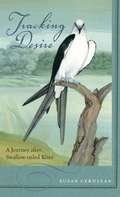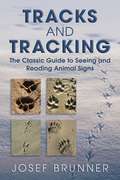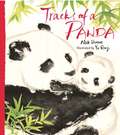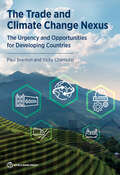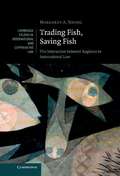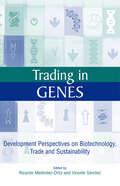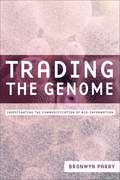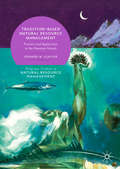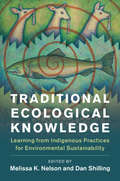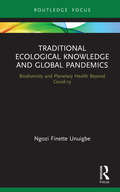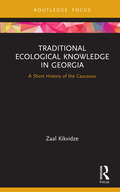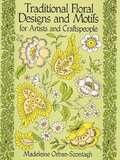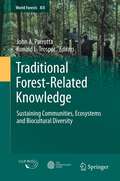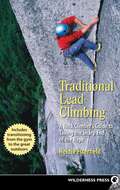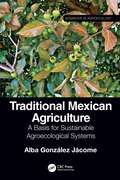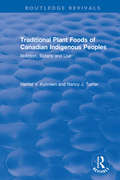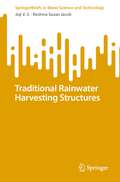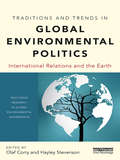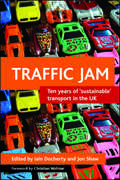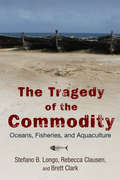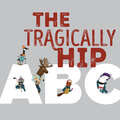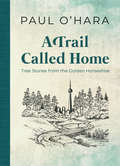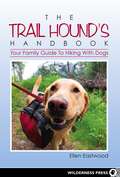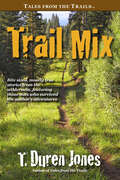- Table View
- List View
Tracking Desire: A Journey After Swallow-tailed Kites
by Susan Cerulean"My memory is etched with a clear image of how that bird swung into view and hung over me, suspended like an angel, so starkly black and white, with its wide-scissored split of a tail." It took just one sighting of a swallow-tailed kite to dispatch Susan Cerulean on a pilgrimage through its fragmented and ever-shrinking habitats. In Tracking Desire, Cerulean immerses us in the natural history and biology of Elanoides forficatus. At the same time, she sifts through her past--as a child, student, biologist, parent, and activist--to muse on a lifelong absorption with nature. Once at home throughout much of the eastern United States, the swallow-tailed kite is now seldom seen. With ornithologist Ken Meyer, and then on her own, Cerulean roams the kite's much-reduced homelands, gaining knowledge about the bird and the grave threats to its breeding grounds and migration patterns. Her quest takes her to the muddy banks of the Mississippi, to an enormous and vulnerable roost on corporate ranchlands in southwest Florida, and to the remnant pinelands of Everglades National Park. In seeking the bird, Cerulean comes to question her own place in our consumerist society. "My journeys after kites have led me to understand that the power of our longings is placing the integrity of life on our tender emerald planet so greatly at risk," she writes. "What are the fractured places in our hearts and minds and spirits that have allowed us to stand by and watch, and even to participate in, the destruction of so much of life?"
Tracking Trash: Flotsam, Jetsam, and the Science of Ocean Motion (Scientists in the Field Series) (Scientists in the Field)
by Loree Griffin BurnsThe author of The Hive Detectives presents &“a unique and often fascinating book on ocean currents, drifting trash, and the scientists who study them&” (Booklist).Aided by an army of beachcombers, oceanographer Dr. Curtis Ebbesmeyer tracks trash in the name of science. From sneakers to hockey gloves, Curt monitors the watery fate of human-made cargo that has spilled into the ocean. The information he collects is much more than casual news; it is important scientific data. And with careful analysis, Curt, along with a community of scientists, friends, and beachcombers alike, is using his data to understand and protect our ocean.In engaging text and unforgettable images, readers meet the woman who started it all (Curt&’s mother!), the computer program that makes sense of his data (nicknamed OSCURS), and several scientists, both on land and on the sea, who are using Curt&’s discoveries to preserve delicate marine habitats and protect the creatures who live in them.A Boston Globe-Horn Book Award Honor Book for Nonfiction&“Even kids not remotely interested in science might find this work captivating.&”—Newsday &“Loaded . . . with information, insight, and intellectual twists.&”—Natural History Magazine&“The well-written narration will keep readers engaged, and it&’s excellent for reports. The science is clearly explained, and the vivid and lively photographs and well-labeled charts and diagrams help to create interest and build understanding. This title will get readers thinking and possibly acting on these problems.&”—School Library Journal (starred review) &“Scientific information builds from chapter to chapter, creating a natural detective story.&”—Horn Book
Tracks and Tracking: The Classic Guide to Seeing and Reading Animal Signs
by Josef BrunnerThe most comprehensive guide to reading the signs and tracks of dozens of animals!"To derive the greatest pleasure from the pursuit of game," Brunner writes in the foreword to this classic hunting guide, "it is necessary to be versed in the science of interpreting the meaning of tracks and trails." With these words, the author begins his comprehensive survey of how to track and read animal signs. To the author-and hunter-this is not simply a matter of skill, but one of honor. A sportsman should consider it a sacred duty to acquire a working knowledge of tracks, trails, and signs.The contents of this book represent the experience gained by the author from twenty years of uninterrupted life in the great outdoors. Included in this book are chapters on hunting on a wide variety of animals, such as: White-tailed deer Moose Bears Bobcats Wolves Cottontail rabbits Otters Badgers Porcupine Feathered game Upland birds Predatory birds And many more!Last published in 1922, Tracks and Tracking is an invaluable resource for hunters of every stripe. Complete with hundreds of detailed illustrations, this book will help anyone looking to increase their ability to read signs and trails and become as well versed in tracking as the author could with years of experience in the woods.
Tracks of a Panda
by Nick DowsonMother Panda holds her newborn cub gently in her giant paw. But as their bamboo patch begins to die, she knows she must take him on a dangerous journey, in search of fresh bamboo and a new home. This is a tender story of love and survival.
The Trade and Climate Change Nexus: The Urgency and Opportunities for Developing Countries
by Paul Brenton Vicky ChemutaiWhile trade exacerbates climate change, it is also a central part of the solution because it has the potential to enhance mitigation and adaptation. This timely report explores the different ways in which trade and climate change intersect. Trade contributes to the emissions that cause global warming and is itself also affected by climate change through changing comparative advantages. The report also confronts several myths concerning trade and climate change. The Trade and Climate Change Nexus: The Urgency and Opportunities for Developing Countries focuses on the impacts of, and adjustments to, climate change in developing countries and on how future trade opportunities will be affected by both the changing climate and the policy responses to address it. The report discusses how trade can provide the goods and services that drive mitigation and adaptation. It also addresses how climate change creates immense challenges for developing countries, but also new opportunities to promote trade diversification in the transition to a low-carbon world. Suitable trade and environmental policies can offer effective economic incentives to attain both sustainable growth and poverty reduction.
Trading Fish, Saving Fish
by Margaret A. YoungNumerous international legal regimes now seek to address the global depletion of fish stocks, and increasingly their activities overlap. The relevant laws were developed at different times by different groups of states. They are motivated by divergent economic approaches, influenced by disparate non-state actors, and implemented by separate institutions such as the World Trade Organisation and the United Nations Food and Agriculture Organisation. Margaret Young shows how these and other factors affect the interaction between regimes. Her empirical and doctrinal analysis moves beyond the discussion of conflicting norms that has dominated the fragmentation debate. Case-studies include the negotiation of new rules on fisheries subsidies, the restriction of trade in endangered marine species and the adjudication of fisheries import bans. She explores how regimes should interact, in fisheries governance and beyond, to offer insights into the practice and legitimacy of regime interaction in international law.
Trading in Genes: Development Perspectives on Biotechnology, Trade and Sustainability
by Ricardo Meléndez Vicente SánchezFew scientific developments have given rise to as much controversy as biotechnology. Numerous groups are united in their opposition, expressing concern over environmental and health risks, impacts on rural livelihoods, the economic dominance of multinational companies and the ethical implications of crossing species boundaries. Among the supporters of the technology are those that believe in its potential to enhance food security, further economic development, increase productivity and reduce environmental pressures. As a result, countries - and sectors within countries - find themselves at odds with each other while potential opportunities for development offered by the use of biotechnology are seized or missed, and related risks go unmanaged. This book, a unique interdisciplinary collection of perspectives from the developing world, examines the ongoing debate. Writing for the International Centre for Trade and Sustainable Development, leading experts address issues such as diffusion of technology, intellectual property rights, the Cartagena Protocol, impacts of international trade, capacity building and biotechnology research and regulation. With the most recent and relevant examples from around the world, Trading in Genes offers the reader a single-volume overview of the connections between biotechnology, trade and sustainability that is both wide-ranging and thorough
Trading the Genome: Investigating the Commodification of Bio-Information
by Bronwyn ParryIn a groundbreaking work that draws on anthropology, history, philosophy, business and law, Parry links firsthand knowledge of the operation of the bioprospecting industry to a sophisticated analysis of broader economic, regulatory, and technological transformations to reveal the complex economic and political dynamics that underpin the new global trade in bio-information.
Tradition-Based Natural Resource Management: Practice and Application in the Hawaiian Islands (Palgrave Studies in Natural Resource Management)
by Edward W. GlazierThis book addresses the complex socio-political context of natural resource management in coastal and marine environments throughout the contemporary Pacific Islands and provides lessons that can be applied around the globe. The author spotlights one particular case in which Native Hawaiians worked successfully to develop a formal policy mechanism through which to advise government agencies in the State of Hawaii on matters regarding traditional and customary use and management of the island’s natural resources. Glazier describes historic-traditional aspects of natural resource use and management in the Hawaiian Islands and the challenging process that was employed to enhance the capacity of modern Hawaiians to influence the course of their future. This process successfully broached and addressed truly difficult challenges, including but not limited to: the convening of representatives of a complex society of indigenous persons in order to elicit traditional place-based knowledge and varying perspectives on the appropriate use and management of natural resources; the incorporation of such knowledge and perspectives into the modern natural resource management and policy context; and the need to balance the interests of indigenous persons and those of more recently-arriving persons around the island chain. The lessons learned were many and varied and are particularly germane for resource managers, scientists, policymakers, and indigenous persons seeking to undertake balanced natural resource policy decisions in island, coastal, and indigenous settings around the Pacific and beyond.
Traditional Ecological Knowledge: Learning from Indigenous Practices for Environmental Sustainability (New Directions in Sustainability and Society)
by Melissa K. Nelson Daniel ShillingThis book examines the importance of Traditional Ecological Knowledge (TEK) and how it can provide models for a time-tested form of sustainability needed in the world today. The essays, written by a team of scholars from diverse disciplinary backgrounds, explore TEK through compelling cases of environmental sustainability from multiple tribal and geographic locations in North America and beyond. Addressing the philosophical issues concerning indigenous and ecological knowledge production and maintenance, they focus on how environmental values and ethics are applied to the uses of land. Grounded in an understanding of the profound relationship between biological and cultural diversity, this book defines, interrogates, and problematizes, the many definitions of traditional ecological knowledge and sustainability. It includes a holistic and broad disciplinary approach to sustainability, including language, art, and ceremony, as critical ways to maintain healthy human-environment relations.
Traditional Ecological Knowledge and Global Pandemics: Biodiversity and Planetary Health Beyond Covid-19 (Routledge Focus on Environment and Sustainability)
by Ngozi Finette UnuigbeThis book demonstrates the importance and potential role of Traditional Ecological Knowledge in foreseeing and curbing future global pandemics. The reduction of species diversity has increased the risk of global pandemics and it is therefore not only imperative to articulate and disseminate knowledge on the linkages between human activities and the transmission of viruses to humans, but also to create policy pathways for operationalizing that knowledge to help solve future problems. Although this book has been prompted by the COVID-19 pandemic, it lays a policy foundation for the effective management or possible prevention of similar pandemics in the future. One effective way of establishing this linkage with a view to promoting planet health is by understanding the traditional ecological knowledge of indigenous peoples with a view to demonstrating the significant impact it has on keeping nature intact. This book argues for the deployment of traditional ecological knowledge for land use management in the preservation of biodiversity as a means for effectively managing the transmission of viruses from animals to humans and ensuring planetary health. The book is not projecting traditional ecological knowledge as a panacea to pandemics but rather accentuating its critical role in the effective mitigation of future pandemics. This book will be of great interest to students and scholars of traditional ecological knowledge, indigenous studies, animal ecology, environmental ethics and environmental studies more broadly.
Traditional Ecological Knowledge in Georgia: A Short History of the Caucasus (Routledge Focus on Environment and Sustainability)
by Zaal KikvidzeThis multidisciplinary book develops a synthesis of traditional ecological knowledge in the Caucasus region in Georgia – a hotspot of natural and cultural diversity. Traditional ecological knowledge connects the knowledge of natural phenomena with the culture of a given human society, and Georgia is an excellent case study for observing this knowledge. The Caucasus region in particular is notable for its natural and ethnocultural diversity and this book weaves together the disciplines of history, environment and ethnography to develop a synthesis of traditional ecological knowledge. Tracing the history of Georgia through two main phases, the hunter and gatherer bands and the agrarian phase, the author examines important events such as the breeding of naked hexaploid wheat, the domestication of the grapevine and the development of viticulture. By utilising this historic perspective it allows us to clearly see how traditional ecological knowledge has increased in sophistication during the long prehistory of Georgia, and most importantly how this type of knowledge underpins the social and economic progress of traditional societies, not only in Georgia, but throughout the world. This book will be of great relevance to interdisciplinary-minded scholars and students who have an interest in the relationships between nature and human society, including anthropologists, historians, biologists, ecologists, botanists, sociologists and ethnographers.
Traditional Floral Designs and Motifs for Artists and Craftspeople (Dover Pictorial Archive)
by Madeleine Orban-SzontaghRe-create a lovely spray of wild roses that once bloomed in abundance on an early nineteenth-century fabric. Duplicate a lush Persian floral print from a kerchief worn in the waning days of the acien régime. These and dozens of other superb royalty-free designs -- adapted from patterns on antique textiles -- are available now to artists and craftspeople in this attractive collection.A noted artist and surface designer has masterfully rendered nearly 230 designs from French, English, German, Swiss, and Russian textiles of the eighteenth and nineteenth centuries. Featured are profusions of flowers, leaves, sprays, branches, fruits, and birds in a wide variety of formats: clusters, bouquets, single vignettes, and more. Also shown are several full-page motifs with a single large, elaborate flower. Captions supply a brief description, date, and place of origin for the designs on each page.Among the many charming samples are floral and butterfly blockprints from Alsace in France (c. 1790), a Kashmir floral motif from England (1805), an English rose bouquet (1834), berries and flowers from Switzerland (1820), and scores of others.
Traditional Forest-Related Knowledge
by John A. Parrotta Ronald L. TrosperExploring a topic of vital and ongoing importance, Traditional Forest Knowledge examines the history, current status and trends in the development and application of traditional forest knowledge by local and indigenous communities worldwide. It considers the interplay between traditional beliefs and practices and formal forest science and interrogates the often uneasy relationship between these different knowledge systems. The contents also highlight efforts to conserve and promote traditional forest management practices that balance the environmental, economic and social objectives of forest management. It places these efforts in the context of recent trends towards the devolution of forest management authority in many parts of the world. The book includes regional chapters covering North America, South America, Africa, Europe, Asia and the Australia-Pacific region. As well as relating the general factors mentioned above to these specific areas, these chapters cover issues of special regional significance, such as the importance of traditional knowledge and practices for food security, economic development and cultural identity. Other chapters examine topics ranging from key policy issues to the significant programs of regional and international organisations, and from research ethics and best practices for scientific study of traditional knowledge to the adaptation of traditional forest knowledge to climate change and globalisation.
Traditional Lead Climbing: A Rock Climber's Guide to Taking the Sharp End of the Rope
by Heidi PesterfieldTraditional Lead Climbing is the first and only guidebook intended to teach rock climbers how to lead with gear. <P><P>Unlike other types of climbing such as sport and direct-aid climbing, "trad" climbing relies on placing your own gear as you climb from the ground. It's also one of the more dangerous climbing activities, where expert guidance is a must. This invaluable guide gives step-by-step descriptions of equipment, rope management, and techniques. Dozens of close-up photos and fun yet informative drawings show situations climbers might encounter and how to deal with them. In addition to covering the basics, the book showcases the experience and wisdom of a number of world-class climbers in self-revealing sidebars.
Traditional Mexican Agriculture: A Basis for Sustainable Agroecological Systems (Advances in Agroecology)
by Alba González JácomeThis long-needed book highlights how traditional Mexican agriculture has changed according to environmental, climatic, geographical, social and cultural conditions. Grounded in archaeological-historical data from interrelated research of various scientific disciplines, the book also draws on studies made by anthropologists of varied small-scale agricultural groups. Traditional Mexican Agriculture is the result of a holistic study of Mexican agriculture. It offers the reader a perspective of traditional agriculture in Mexico from social, cultural and ecological Anthropology, Ethnology, regional and environmental History, and Agroecology, to help obtain sustainable agroecology where human societies obtain better ways of life and a healthy and nutritious food system. The book further aims to recover ideas, management, and components of local knowledge of small-scale farmers. Pitched at university students and academics, as well as researchers and developers of agricultural matters, this book will be ideal reading at agrarian universities and related institutions. It provides a basis for future studies in sustainable agricultural systems in this region.
Traditional Plant Foods of Canadian Indigenous Peoples: Nutrition, Botany and Use (Routledge Revivals)
by Harriet Kuhnlein Nancy J TurnerFirst published in 1991, Traditional Plant Foods of Canadian Indigenous Peoples details the nutritional properties, botanical characteristics and ethnic uses of a wide variety of traditional plant foods used by the Indigenous Peoples of Canada. Comprehensive and detailed, this volume explores both the technical use of plants and their cultural connections. It will be of interest to scholars from a variety of backgrounds, including Indigenous Peoples with their specific cultural worldviews; nutritionists and other health professionals who work with Indigenous Peoples and other rural people; other biologists, ethnologists, and organizations that address understanding of the resources of the natural world; and academic audiences from a variety of disciplines.
Traditional Rainwater Harvesting Structures (SpringerBriefs in Water Science and Technology)
by Joji V.S. Reshma Susan JacobThis book contains detailed information about the traditional rainwater structures. Harvesting rainwater is becoming as a practical adaptation strategy for urban areas that are vulnerable to climate alteration. In the past, rainwater harvesting was more significant than it is today. Studies show that a variety of traditional and age-old rainwater gathering techniques were created or put into use in reaction to earlier climate change incidents. According to history, both floods and droughts were frequent occurrences in ancient India. Perhaps this explains why each region of the nation has its own traditional water gathering practices that are representative of the local physical and cultural diversity. All of these methods can be seen as a concept of harvesting rain whenever and wherever it falls. Water makes up 70.9 % of the Earth's surface, mainly in the form of oceans and seas. Water is found in modest proportions as 1.7 % groundwater, 1.7 % glaciers and ice caps in Antarctica and Greenland, vapour, clouds (ice and liquid water suspended in air), and 0.001% precipitation in the air. Evaporation, transpiration, evapo-transpiration, condensation, precipitation, root absorption, percolation, infiltration, base flow and runoff are processes that water goes through on its way to the sea.
Traditions and Trends in Global Environmental Politics: International Relations and the Earth (Routledge Research in Global Environmental Governance)
by Olaf Corry Hayley StevensonHow can a divided world share a single planet? As the environment rises ever higher on the global agenda, the discipline of International Relations (IR) is engaging in more varied and transformative ways than ever before to overcome environmental challenges. Focusing in particular on the key trends of the past 20 years, this volume explores the main developments in the global environmental crisis, with each chapter considering an environmental issue and an approach within IR. In the process, adjacent fields including energy politics, science and technology, and political economy are also touched on. Traditions and Trends in Global Environmental Politics is aimed at anybody interested in the key international environmental problems of the day, and those seeking clarification and inspiration in terms of approaches and theories that decode how the environment is accounted for in global politics. It will be an essential resource for students and scholars of global environmental politics and governance, environmental studies and IR.
Traffic jam: Ten years of 'sustainable' transport in the UK
by Iain Docherty and Jon ShawThis informed and lively book offers a timely analysis of the UK government's sustainable - or subsequently 'integrated' - transport policy 10 years after the publication of A New Deal for Transport: Better for Everyone. Written by prominent transport experts and with a foreword by Christian Wolmar, the book identifies the modest successes and, sadly, the far more significant failures in government policy over the last decade. The authors also uncover why it has proved so difficult to adopt a more sustainable approach to transport and break Britain's love-affair with the car. The book reviews the links between the idea of sustainability and transport policy, and provides an up-to-the-minute analysis of the political realities surrounding the delivery of a sustainable transport agenda in the UK. It picks up on the principal components of A New Deal for Transport and evaluates to what extent these have, or haven't, been delivered in England, Scotland, Wales and Northern Ireland. The contributors analyse why delivering sustainable transport policies seems to present particular difficulties to ministers across the UK, and considers the UK's experience in an international perspective. The book draws lessons from the last 10 years in order to better inform future policy development. Traffic Jam is an indispensable analysis of the difficulties involved in turning policy ideals into practical reality, and as such will be of interest to scholars, students, planners, policy analysts and policy makers.
The Tragedy of the Commodity
by Stefano B. Longo Rebecca Clausen Brett ClarkAlthough humans have long depended on oceans and aquatic ecosystems for sustenance and trade, only recently has human influence on these resources dramatically increased, transforming and undermining oceanic environments throughout the world. Marine ecosystems are in a crisis that is global in scope, rapid in pace, and colossal in scale. In The Tragedy of the Commodity, sociologists Stefano B. Longo, Rebecca Clausen, and Brett Clark explore the role human influence plays in this crisis, highlighting the social and economic forces that are at the heart of this looming ecological problem. In a critique of the classic theory "the tragedy of the commons" by ecologist Garrett Hardin, the authors move beyond simplistic explanations--such as unrestrained self-interest or population growth--to argue that it is the commodification of aquatic resources that leads to the depletion of fisheries and the development of environmentally suspect means of aquaculture. To illustrate this argument, the book features two fascinating case studies--the thousand-year history of the bluefin tuna fishery in the Mediterranean and the massive Pacific salmon fishery. Longo, Clausen, and Clark describe how new fishing technologies, transformations in ships and storage capacities, and the expansion of seafood markets combined to alter radically and permanently these crucial ecosystems. In doing so, the authors underscore how the particular organization of social production contributes to ecological degradation and an increase in the pressures placed upon the ocean. The authors highlight the historical, political, economic, and cultural forces that shape how we interact with the larger biophysical world. A path-breaking analysis of overfishing, The Tragedy of the Commodity yields insight into issues such as deforestation, biodiversity loss, pollution, and climate change.
The Tragically Hip ABC
by The Tragically HipA love letter to The Tragically Hip, one of Canada's most beloved bands, this ABC picture book features illustrations from four renowned Canadian illustrators.The Tragically Hip, fronted by the late Gord Downie, is a legendary, bestselling Canadian band. And now, almost forty years of music can be appreciated in a brand-new way: an ABC picture book! From "A is for Ahead by a Century" to "N is for New Orleans is Sinking" all the way to "Z is for Frozen in My Tracks," this illustrated ode to the band will be enjoyed by readers of all ages. Featuring art from Canadian illustrators Clayton Hanmer, Julia Breckenreid, Bridget George and Monika Melnychuk, this is the perfect gift for Hip fans old and new!
A Trail Called Home: Tree Stories from the Golden Horseshoe
by Paul O'HaraAn exploration of trees in the Golden Horseshoe and the stories they tell. Trees define so much of Canadian life, but many people, particularly in the Golden Horseshoe area of Ontario, don’t know that much about them. Granted, it is harder here: there are more trees that are native to this area than anywhere else in Canada. The great storytellers of the landscape, trees are looking glasses into the past. They speak of biology, ecology, and geology, as well as natural and human history. Through a greater understanding of trees, we can become more rooted to the land beneath our feet, and our place in it.
The Trail Hound's Handbook
by Ellen EastwoodThe Trail Hound's Handbook aims to turn children on to nature and hiking by introducing them to the highly skilled, naturally enthusiastic trail guide that is the family dog. The book reinvents the hiking guidebook as a pet-focused, outdoor activity guide for children and their families. With a lighthearted voice and a slew of fun facts, the format provides immediate pay-off to the curious hiking novice and dog-loving kid, as well as valuable, common-sense skills to support a lifetime of outdoor adventure. The book's companion website, KidsHikeDogsHike.com invites young trail hounds to share their own dog-powered adventures with the world. Like the book, the website aims to keep the topic fun and dynamic, offering select news, and useful resource links, as well as fun, related videos and activities.
Trail Mix: Bite sized, mostly true stories from the wilderness, featuring those who survived the author's adventures
by T. Duren JonesGoing hiking? Don&’t forget to pack these bite-sized, mostly true stories from the wilderness, featuring those who survived the author&’s adventures. T. Duren Jones loves hiking wilderness trails. He gets out as often as he can, and enjoys taking friends and family on his explorations. Most of those who have joined his adventures still talk to him. He has hiked hundreds of trails in the American West, has summited all of the fifty-four Colorado 14,000 ft. peaks (now on his second round with his granddaughter), and has trekked the nearly 500 miles of the Colorado Trail&’s twenty-eight segments from Denver to Durango. Once he&’s done with one checklist, he on to the next—this guy is nuts! This book is a follow-up to Tales from the Trails, this time with new stories presented in bite-sized pieces. Snack on a few at a time, but you might not want to put it down and end up eating, er, reading, the whole package in one sitting. As with his previous book, Trail Mix is part adventure, part travelogue, part motivational encouragement, part cautionary tale, and part stand-up comedy (at least the author thinks so). Trail Mix is for anyone who loves spending time in the outdoors, who wishes they could be outdoors more, or who simply enjoys reading about nuts who spend time in the great outdoors. The author hopes by sharing these adventures—and misadventures—that the readers will be inspired to go out and discover their own stories.
